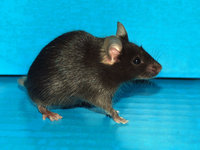Strain Data Sheet
RBRC01123
Strain Information | |
|---|---|
| Image |  |
| BRC No. | RBRC01123 |
| Type | Transgene Congenic |
| Species | Mus musculus |
| Strain name | C57BL/6-Tg(AGT)2-5Afu/AfuRbrc |
| Former Common name | hAG 2-5 |
| H-2 Haplotype | |
| ES Cell line | |
| Background strain | C57BL/6J |
| Appearance | black [a/a B/B C/C] |
| Strain development | Developed by Dr. Akiyoshi Fukamizu, University of Tsukuba in 1991. C57BL/6 background. |
| Strain description | Human angiotensinogen gene transgenic mice with integration of 100 copies of a 14 kbp human DNA fragment containing the angiotensinogen gene (hAG 2-5 mice). The renin-angiotensin system (RAS) is one of the determinant factors in regulating blood pressure and sodium absorption. RAS has been shown to accelerate various diseases such as renal failure, atherosclerosis, cardiac hypertrophy, and pulmonary hypertension. The reaction between renin, produced in the kidney, and its substrate angiotensinogen, produced in the liver, is the initial and rate-limiting step in the enzymatic cascade that generates angiotensin I. Angiotensin-converting enzyme in the lung converts angiotensin I to the potent vasoconstrictor angiotensin II (Ang II). The depositor reported that overactivation of the RAS induces hypertension in the F1 generation obtained from breeding between a female carrying the human renin gene (hRN+/+) and a male possessing the human angiotensinogen gene (hAG+/+). Moreover, female hAG+/+ mice when bred with male hRN+/+ mice are hypertensive specifically in late pregnancy, suggesting possible implications for preeclampsia or pregnancy-induced hypertension, a life-threatening disorder for human mothers and fetuses. hRN+/+ and hANG+/+ mice provide the opportunity to understand the role of the RAS in hypertension and other common diseases. hRN8-12 mice (RBRC01122), hAG 2-5 mice (RBRC01123), hRN8-12 x hAG2-5)F1 mice (RBRC02432). |
| Colony maintenance | Carrier x Carrier (Homozygote x Homozygote) Homozygous mice are viable and fertile. |
| References | Expression of the human angiotensinogen gene in transgenic mice and transfected cells. Takahashi S, Fukamizu A, Hasegawa T, Yokoyama M, Nomura T, Katsuki M, Murakami K Biochem. Biophys. Res. Commun., 180, 1103-1109 (1991). 1659395 |
Health Report | |
|---|---|
| Examination Date / Room / Rack | 2024/09/09Room:3-2Rack:C 2024/06/10Room:3-2Rack:C 2024/03/11Room:3-2Rack:C 2023/12/11Room:3-2Rack:C 2023/09/11Room:3-2Rack:C 2023/06/13Room:3-2Rack:C 2023/03/13Room:3-2Rack:C |
Gene | |||||||
|---|---|---|---|---|---|---|---|
| Gene Symbol | Gene Name | Chr. | Allele Symbol | Allele Name | Common Names | Promoter | Diseases Related to This Gene |
| AGT | Angiotensinogen (human) | UN | AGT | ||||
Phenotype | |
|---|---|
| Annotation by Mammalian phenotyhpe ontology | more 14 phenotypes |
| Detailed phenotype data | |
Ordering Information | |
|---|---|
| Donor DNA | human angiotensinogen genomic DNA |
| Research application | Cell Biology Research Hematological Research covid19_progression |
| Specific Term and Conditions | The RECIPIENT of BIOLOGICAL RESOURCE shall obtain a prior written consent on use of it from the DEPOSITOR. In publishing the research results obtained by use of the BIOLOGICAL RESOURCE, a citation of the following literature(s) designated by the DEPOSITOR is requested. Biochem. Biophys. Res. Commun., 180, 1103-1109 (1991). Within a period of 2 years after deposition of the material, user must contact bailor and notify him a content of the research. If the bailor judges that the research should be a collaborative work, then user must include bailor and/or developer's names as co-authors. |
| Depositor | Akiyoshi Fukamizu (University of Tsukuba) |
| Strain Status |  Frozen embryos Frozen embryos Frozen sperm Frozen sperm |
| Strain Availability | Recovered litters from cryopreserved embryos (2 to 4 months) Cryopreserved sperm (within 1 month) Cryopreserved embryos (within 1 month) |
| Additional Info. | Necessary documents for ordering:
Genotyping protocol -PCR- Mouse of the Month May 2012 Systolic blood pressure |
BRC mice in Publications |
|---|
Inaba S, Iwai M, Furuno M, Tomono Y, Kanno H, Senba I, Okayama H, Mogi M, Higaki J, Horiuchi M. Continuous activation of renin-angiotensin system impairs cognitive function in renin/angiotensinogen transgenic mice. Hypertension 53(2) 356-62(2009) 19047580 |
Ogawa M, Suzuki J, Takayama K, Senbonmatsu T, Hirata Y, Nagai R, Isobe M. Impaired post-infarction cardiac remodeling in chronic kidney disease is due to excessive renin release. Lab Invest 92(12) 1766-76(2012) 22986786 |
Inaba S, Iwai M, Tomono Y, Senba I, Furuno M, Kanno H, Okayama H, Mogi M, Higaki J, Horiuchi M. Exaggeration of focal cerebral ischemia in transgenic mice carrying human Renin and human angiotensinogen genes. Stroke 40(2) 597-603(2009) 19023100 |